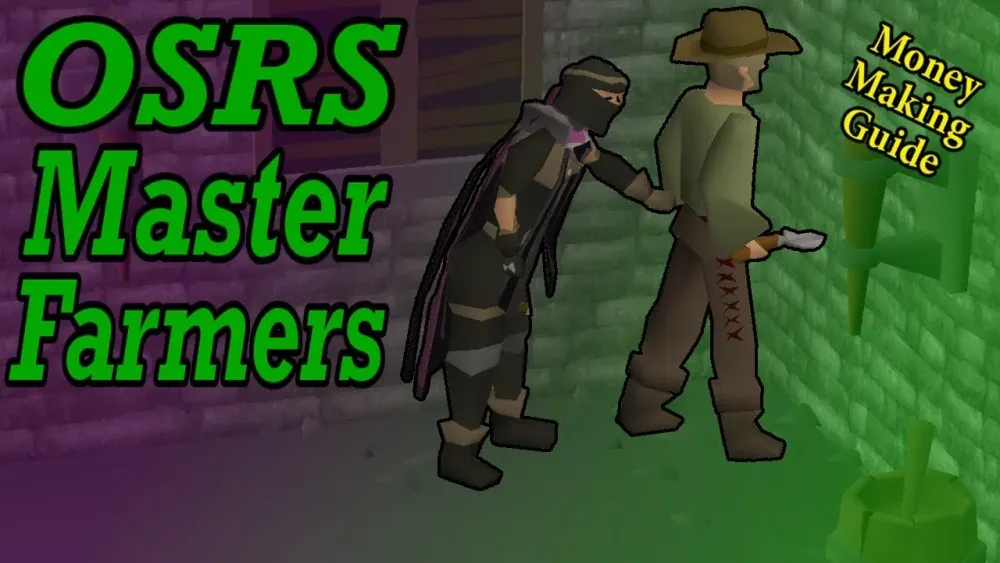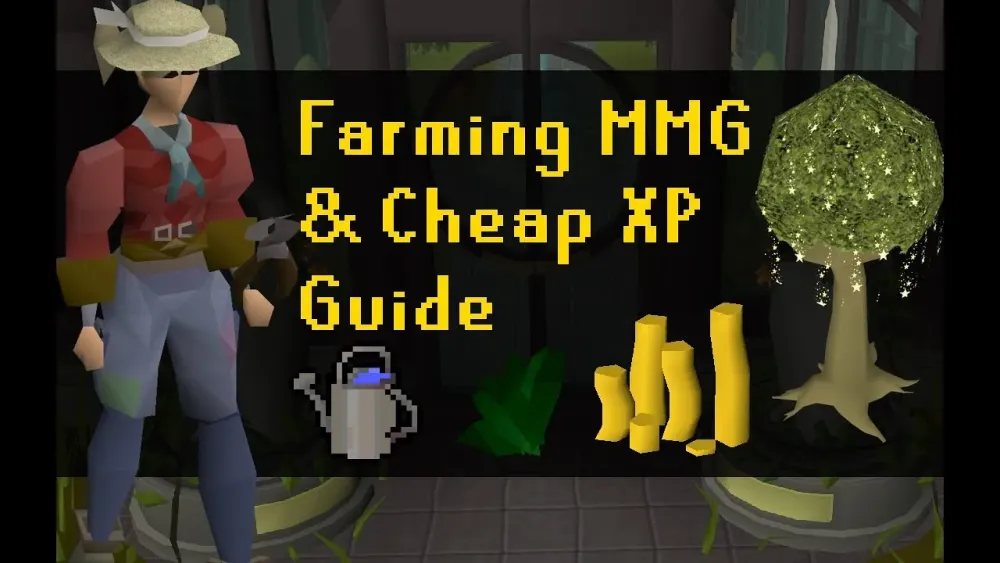Your cart is empty
Mastering Farming Training for Ironman in OSRS

Farming in Old School RuneScape (OSRS) is a unique skill that allows players to grow their own crops, herbs, and trees, providing a sustainable source of resources. It’s a skill that requires patience and strategic planning, especially for Ironman accounts, where resource management is crucial. This guide delves into the fundamentals of Farming in OSRS and highlights its significance for Ironman players, equipping you with the knowledge to effectively master this essential skill.
Farming is particularly vital for Ironman accounts due to their self-sufficient nature. Unlike regular accounts, Ironman players cannot trade with others, making it imperative to gather resources independently. Farming provides a steady income of valuable items that can aid in various gameplay aspects, including combat, skilling, and questing.
One of the primary benefits of Farming is access to herbs. Herbs are essential for creating potions, which are crucial for combat and skilling. By growing your own herbs, you can ensure a continuous supply of potions, such as Saradomin Brews and Super Restore potions, which significantly enhance your survivability during boss fights and difficult tasks.
Additionally, Farming allows Ironman players to cultivate their own food sources. By growing crops like potatoes and carrots or trees like fruit trees, players can have a renewable supply of food for healing. This is especially important in challenging content, where food resources can diminish quickly.
Another advantage of Farming is the ability to gain experience through activities like tree farming. Planting and harvesting trees can yield significant experience points, allowing players to level up their Farming skill efficiently. This is crucial for unlocking higher-level crops and tree types, which in turn offer better resources for potions and food.
Moreover, Farming contributes to completing various quests and achieving specific game milestones. Many quests require items that can only be obtained through Farming, making it a necessary skill for progressing through the game. Players who invest time in developing their Farming skill will find themselves better equipped to tackle the challenges that OSRS presents.
In conclusion, mastering Farming is essential for Ironman accounts in OSRS. It not only provides a sustainable source of resources but also enhances overall gameplay by contributing to combat effectiveness, quest completion, and skill progression. Investing time in this skill will yield significant long-term benefits, making it a key component of your Ironman journey.
Getting Started with Farming: Required Tools and Supplies

So, you’re ready to dive into Farming in OSRS? Awesome choice! Farming is not only a great way to earn some extra cash, but it also complements other skills beautifully. To kick things off, you’ll need a few essential tools and supplies. Let’s break it down:
- Seed Dibber: This handy tool allows you to plant your seeds in the soil. You can purchase it from any farming shop or get it from the Farming Guild.
- Trowel: You’ll need this for planting seeds in flower patches and for some other farming activities. Like the seed dibber, it’s available at farming shops.
- Rake: Don’t forget to bring a rake! You’ll need it to clear patches of weeds before planting your seeds.
- Watering Can: For certain plants, especially in the early levels, watering them can help boost their growth. Just fill it up at any water source!
- Compost: Using compost on your patches will increase the yield of your crops. You can make compost using organic waste or buy it from various shops.
- Seeds: Naturally, you’ll need seeds! Start with easy-to-grow plants like potatoes or cabbages.
Once you have these tools and supplies, you’re all set to start your farming journey! Just remember to check your patches regularly to ensure everything is growing smoothly.
Optimal Farming Locations and Strategies
Now that you have your tools, let’s talk about where to farm. Choosing the right location can make a huge difference in your experience. Here are some of the best spots and strategies to use:
| Location | Type of Crops | Notes |
|---|---|---|
| Draynor Village | Potatoes, Onions | Close bank access; great for low-level farming. |
| Falador | Flowers, Herbs | Good experience; nearby bank for easy supply management. |
| Ardougne | Various crops; high yield | Best for mid to high-level players; requires quest completion. |
| Kandarin | Fruit Trees | Great for higher-level farming; longer growth times. |
Strategies:
- Regular Check-Ins: Make it a habit to check your patches frequently to maximize your yield.
- Use Fertilizers: Boost your crop production with compost and super compost.
- Plan Your Planting: Strategically plant different crops to avoid long waiting times.
- Combine with Other Skills: Consider farming while training your woodcutting or fishing skills for efficiency.
By choosing the right locations and employing effective strategies, you’ll be well on your way to mastering Farming in OSRS. Happy farming!
5. Best Crops to Grow for Ironman Players
When it comes to farming in Old School RuneScape (OSRS) as an Ironman, choosing the right crops can make a significant difference in your overall efficiency and success. Here’s a list of some of the best crops to consider:
- Potatoes – Easy to grow and provide a good yield. Plus, they can be used for cooking and other tasks.
- Onions – Another low-level crop, onions can be used in cooking and have a decent experience rate.
- Sweetcorn – Grows quickly and is used in various recipes, making it a staple for Ironman players.
- Herb Seeds – Growing herbs like Ranarr or Snapdragon is fantastic for potions, which are crucial for Ironman gameplay.
- Snapdragons – These are particularly valuable due to their use in high-level potions.
- Marigolds – Though they don’t provide food, Marigolds are great for repelling pests and can be grown alongside other crops.
Each of these crops has its benefits, and selecting the right ones will depend on your current goals. For instance, if you want to focus on combat, growing herbs may be more beneficial than food crops. It’s also wise to consider crop rotations and farming patches to maximize your yield.
6. Experience Rates and Farming Methods
Understanding experience rates and effective farming methods is essential for Ironman players looking to level up quickly in OSRS. Here are some key points to help you master your farming journey:
| Crop | Experience per Harvest | Growth Time |
|---|---|---|
| Potatoes | 5 XP | 40 minutes |
| Onions | 10 XP | 40 minutes |
| Sweetcorn | 12 XP | 80 minutes |
| Herbs | 13 XP | 80 minutes |
To maximize your experience rates, consider the following methods:
- Paying Attention to Growth Times: Timing your farming activities can ensure you’re efficiently using your time, particularly for crops with longer growth times.
- Utilizing Farming Contracts: These offer additional experience and rewards, making them a worthwhile investment.
- Using Super Compost: Enhances the yield and reduces the chance of disease, giving you more crops to harvest.
In conclusion, mastering the farming skills in OSRS as an Ironman player is all about choosing the right crops and employing effective methods. This approach will streamline your farming process and contribute significantly to your overall success in the game.
7. Advanced Farming Techniques for Efficient Training
When it comes to leveling up your Farming skill in OSRS, adopting advanced techniques can save you time and resources. Here are some tips to make your farming sessions more efficient:
- Herb Runs: Focus on growing herbs like Ranarr and Snapdragon. They’re not only profitable but also level up your Farming skill quickly.
- Tree Runs: Planting and harvesting trees such as Magic and Yew can yield significant experience. Make sure to use the Tree Gnome Stronghold and Farming Guild for quick access.
- Fruit Tree Planting: Fruit trees provide a good amount of experience and can be planted alongside your regular trees for a more structured farming schedule.
- Patch Management: Always use super compost or ultracompost in your patches to increase yield, which means more experience when you harvest.
- Farm Contracts: Completing farm contracts from the Farming Guild not only gives you experience but also rewards that can help with future farming endeavors.
By incorporating these advanced techniques into your routine, you can maximize your Farming experience while minimizing the amount of time spent.
8. Utilizing Farming Quests to Boost Your Skills
Quests in OSRS offer a fantastic way to gain Farming experience and unlock useful rewards. Here’s how you can leverage them to enhance your Farming skill:
- Quest Rewards: Many quests grant you Farming experience upon completion. For example, completing “The Garden of Tranquility” gives you a hefty 3,000 experience points!
- Unlocking New Areas: Certain quests will unlock farming patches and areas that make it easier to grow specific crops, like “A Fairy Tale I” which opens up fairy rings for easy travel.
- Items and Tools: Some quests reward you with useful farming tools, such as the Magic Secateurs, which boost your yield when harvesting.
- Experience Boosts: Completing quests like “The Recipe for Disaster” can also grant experience boosts to multiple skills, including Farming.
Incorporating questing into your Farming training not only breaks the monotony but also provides valuable rewards that can significantly accelerate your progress. Don’t overlook the power of quests in your journey to master Farming!
Mastering Farming Training for Ironman in OSRS
Farming is a unique skill in Old School RuneScape (OSRS) that allows players to grow their own crops, herbs, and trees. For Ironman accounts, where resources are limited, mastering farming is essential for self-sufficiency. Here’s how to optimize your farming training.
Essential Farming Quests
Completing farming quests can provide significant experience and unlock new farming patches. Key quests include:
- Garden of Tranquility – Grants access to various farming patches.
- Fairytale I: Growing Pains – Unlocks the ability to grow magic trees.
- Fairytale II: Cure a Queen – Provides access to the fairy ring network.
Best Crops for Training
Choose crops based on your farming level and the experience they yield:
| Crop | Level Required | Experience |
|---|---|---|
| Potatoes | 1 | 5 |
| Herbs (e.g., Guam) | 3 | 15 |
| Cabbage | 7 | 30 |
| Sweetcorn | 20 | 60 |
Utilizing Farming Patches
Farming patches are scattered throughout Gielinor. Here are some key locations:
- Ardougne – Great for multiple crop types.
- Falador – Easy access and close proximity to a bank.
- Canifis – Ideal for herb farming.
Tips to Maximize Efficiency
To make the most out of your farming experience:
- Plant crops that yield the most experience for your level.
- Use compost to increase yield and reduce disease.
- Consider planting herbs for profit and experience.
By focusing on these strategies, you can efficiently level up your farming skill and ensure a steady supply of resources for your Ironman journey.
Conclusion: Making the Most of Your Farming Journey
By mastering farming training techniques, completing essential quests, and utilizing the right crops and patches, Ironman players can enhance their game experience and achieve self-sufficiency in OSRS.

